BY PATRICIA HARRITY ON • ( 6 COMMENTS )

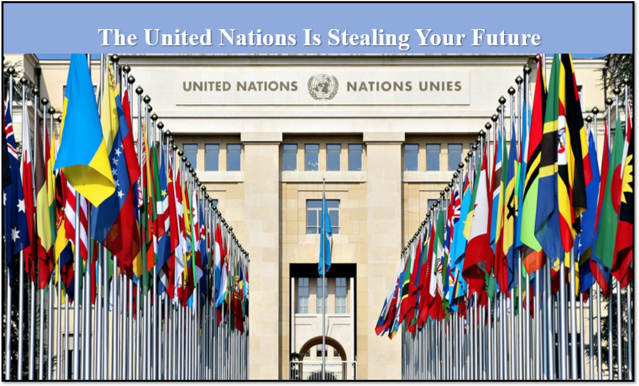
You didn’t want it. You didn’t vote on it. You didn’t give input on it. You don’t dare to question it. The oracle of science as spoken. Technocrats have decided it all for you. With your public taxes. You will own nothing. Are you happy now? We should drop-kick these grifters and the U.N. headquarters into the Atlantic Ocean.⁃ says the editor from Technology News.
Nevertheless, these unelected, unwanted “grifters” are not interested whether you are happy with what they have decided for your future and despite worldwide opposition, they will be pressing on with their plans to establish a new global order and our enslavement aided by a AI digital control system.
They are “summoning the pact for your future” according to Dr Jacob Nordangard who has a PhD in technology and social change and has published an article that shows the future implications of the intergovernmental negotiations that are seeking to undemocratically “shape” our future based on the United Nations Common agenda and the fulfilment of Agenda 2030 Sustainable Development Goals. Dr Nordangard’s article has been republished below.
Summoning the Pact for the Future.
New Global Order with a digital control system run by “trustworthy” AI By Dr Jacob Nordangard
Preparations have now begun for this year’s Summit of the Future, that will be held September 22–23 at the United Nations headquarters in New York.
During this meeting world leaders will sign the outcome document “The Pact for the Future”. This will be agreed in advance through intergovernmental negotiations and is based on United Nations Our Common Agenda and the fulfilment of Agenda 2030 with its 17 Sustainable Development Goals.
A zero draft of the pact was released January 26th after input from over 500 Major Groups and other Stakeholders.1 It was presented by the co-facilitators in the UN Trusteeship Council and followed by a debate with member states representatives January 29th.2

As described on the Summit of the Future webpage:
The result will be a world – and an international system – that is better prepared to manage the challenges we face now and in the future, for the sake of all humanity and for future generations.3
The purpose is to “take action to safeguard the future for present and coming generations”. Crises management is at the Pact’s core. And there is no lack of crises in need of effective management. As described in the zero draft:
We are at a moment of acute global peril. Across our world, people are suffering from the effects of poverty, hunger, inequality, armed conflicts, violence, displacement, terrorism, climate change, disease, and the adverse impacts of technology. Humanity faces a range of potentially catastrophic and existential risks.4
But with crises comes opportunities. At least for some powerful actors.
The goal of the pact should, according to United Nation’s High-Level Advisory Panel on Effective Multilateralism, be: “a global transition by States and non-State actors to a circular economy, addressing both supply and demand in a way that achieves balance with the planet.” This is a technocratic concept.
The HLAB was set up in March 2022 by Secretary General António Guterres to advice the Member States “on those issues of key global concern where governance improvements are most needed.”
Their report, A Breakthrough for People and Planet: Effective and Inclusive Global Governance for Today and the Future, recommends six transformative shifts to “support a radical shift in international cooperation for the resolution of shared global challenges and the advancement of the 2030 Agenda for Sustainable Development”. These are:
- Rebuild trust in multilateralism – Improve legitimacy and effectiveness through inclusion and accountability
- Planet and People – Regain balance with nature and provide clean energy for all
- Global Finance –Ensure sustainable finance that delivers for all
- Digital and Data Governance – Support a just digital transition that unlocks the value of data and protects against digital harms
- Peace and Prevention – Empower effective, equitable collective security arrangements
- Anticipatory Action – Strengthen governance for current and emerging transnational risks
This has been anchored from the top echelons of power. Among the members in the HLAB on Effective Multilateralism were WEF-board member Tharman Shanmugaratnam (newly elected President of Singapore), WEF Young Global Leader Ilona Szabó de Carvalho, Rockefeller Foundation-trustee Donald Kaberuka and Council on Foreign Relations and Trilateral Commission member, Ann-Marie Slaughter.
Their advice is a recipe for a world-wide technocratic management system that, if everything goes according to plan, will be guided by the global public–private partnership that was formalised in June 2019 with the signing of United Nation’s and World Economic Forum’s strategic partnership.
The intergovernmental forum G20 will have an important role to anchor these ambitions, influence legislators and implement the policies nationally.5
Since the adoption of the 2016 G20 Action Plan on the 2030 Agenda for Sustainable Development, G20 Leaders have consistently recognized the key role of the G20 in contributing to implementation of the 2030 Agenda.6
Our Common Agenda and the “Pact for the Future” can be seen as the United Nations’ answer to the call for a Great Reset that was announced in June 2020 by Klaus Schwab, António Guterres and Prince Charles (King Charles III). In the words of Guterres:
The Great Reset is a welcome recognition that this human tragedy must be a wake-up call. As you rightly say, it is imperative that we reimagine, rebuilt, redesign, reinvigorate and rebalance our world…
We must build more equal, inclusive and sustainable economies and societies that are more resilient in the face of pandemics, climate change and many of the other global challenges we face.
You will be required to transform your values, “serve the common good” and connect to the digital world brain. It will also give immense power to the UN-system and partnering organisations in case of a global planetary emergency.
During the last year, eleven Policy Briefs have been released about how to achieve the twelve commitments that were proposed in Our Common Agenda by General Secretary Guterres.
The policy process is also interlinked with the negotiations on a new WHO Pandemic Accord (and an update of the International Health Regulations) that is planned to be concluded at World Health Assembly in May.
The accord goes hand in hand with the proposed “Emergency Platform” (Policy Brief 2) that will be convened by the UN General Secretary in case of a complex global shock including “future pandemics with cascading secondary impacts”.
Member States should according to the policy brief therefore “improve preparedness not only for health-related crises but also for other challenges and crises”. The aim is a set of protocols that will be activated in case of a major crisis.
Emergency Platform to manage “extreme global shocks”
JACOB NORDANGÅRD MARCH 21, 2023

United Nations recently published a policy brief on the twelfth commitment of Our Common Agenda – Emergency Platform. This commitment establishes the need to improve preparedness in more areas besides global health crises (such as pandemics) and will give UN extensive powers in a new crisis situation.
HLAB Co-chair Ellen Sirleaf headed the WHO Independent Panel on Pandemic Preparedness and Response (2020-21) whereas Tharman Shanmugaratnam headed the G20 High Level Independent Panel on Financing the Global Commons for Pandemic Preparedness and Response (2021). Both these reports have served as a foundation for the proposed accord.
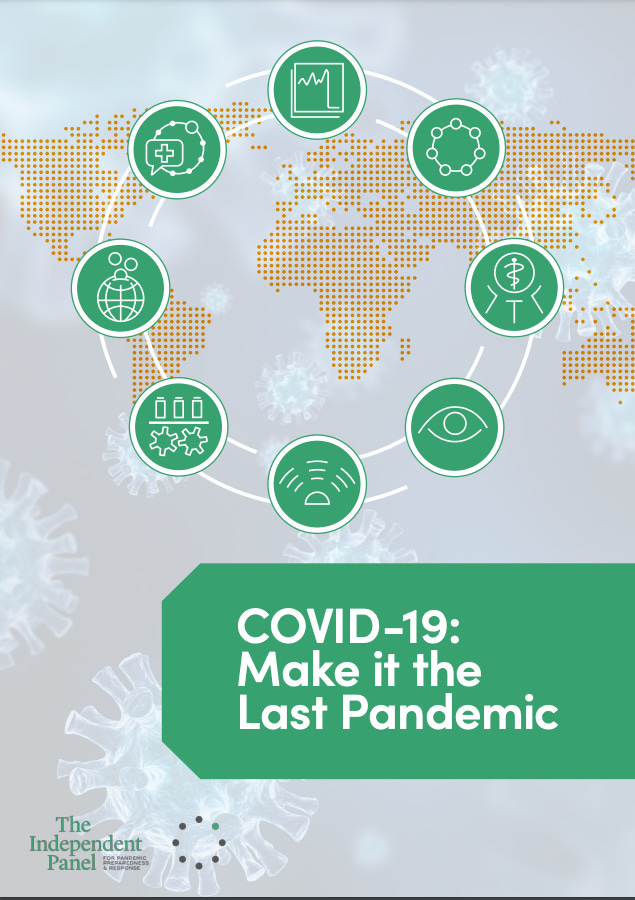
However, according to WHO Director General Thedros Adhanom Ghebreyesus, the accord is threatened because of “fake news, lies and conspiracy theories” that undermines the process.7 This is something that is addressed in the Policy Brief Information Integrity on Digital Platforms.
Mis- and disinformation are having a profound impact on democracy, weakening trust in democratic institutions and independent media, and dampening participation in political and public affairs.8
It means that this problem has to be managed. Countering mis- and disinformation is an important part of the UN/WEF/G20 agenda.9
The eleven Policy Briefs contain the blueprint for a digital system (Global Digital Compact) that will be run with the help of “trustworthy” Artificial Intelligence. We can assume that “trustworthy” means that it will not criticise UN policies (like the SDGs and The Paris Agreement). The AI has to be in tune with the “Al Gore rhythm”.
Summary of the Policy Briefs
Below is my presentation of the main components in the proposed “Pact for the Future”, followed by an oversight of the Policy Briefs, key proposals and projects currently being developed by United Nations and external affiliated actors.
“Population control”
Halt and prevent developments that could threaten the survival of future generations
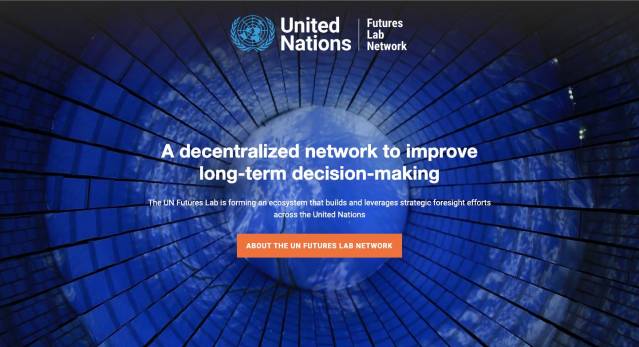
- Envoy for Future Generations
- Declaration on Future Generations
- Intergovernmental Forum for Future Generations
- Futures Lab Network
- UN Global Pulse
The goal of the UN Futures Lab is to improve long-term decision-making, by guiding teams in putting foresight into practice and providing frameworks and capacity-building that empower them to build the resilient, anticipatory United Nations the world needs.10

“Martial law”
Rapid international response to complex global shocks

- Emergency Platform
- Planetary Emergency Partnership (Club of Rome, PIK, WWF)
- Planetary Emergency Plan (Club of Rome)
- Global Commons Alliance (Project by Rockefeller Philanthropy Advisors)
The platform would not be a new permanent or standing body or institution. It would be triggered automatically in crises of sufficient scale and magnitude, regardless of the type or nature of the crisis involved.11

“Youth activism to transform the world”
Make youth into “torchbearers” for the SDGs

- Global standard for meaningful youth engagement
- Framework to track progress
- UN Youth Townhall Meetings
- Envoy on Youth
- UN Youth Strategy
In recent years, young people have become a driving force for societal change through social mobilization – pushing for climate action, seeking racial justice, promoting gender equality and demanding dignity for all.12

“Data Collection”
Comprehensive metrics to ensure policymaking is guided by the needs of people and planet
- Develop a conceptual framework to “value what counts”, anchored in the 2030 Agenda
- Develop value dashboard of key indicators
- Strengthen statistical capacity-building and data collection
- UN Data Commons for the SDGs
- SDG Transformation Center
We need a paradigm shift in what we measure as progress, so that we can capture data on the activities and outcomes that a society truly values and then use the data to better inform our policy and financial decisions.13

“Digital World Brain”
Human-centred digital future anchored in human rights, enabling the SDGs

- Global Digital Compact
- AI Governance
- AI body to align artificial intelligence with human rights, the rule of law and the common good
- High-Level Advisory Body on Artificial Intelligence
- AI for Good
The transformative potential of AI for good is difficult even to grasp. And we are in urgent need of this enabler and accelerator. As many countries are already reeling from the impact of the climate crisis. The 2030 Agenda — our global blueprint for peace and prosperity on a healthy planet — is in deep trouble.14
AI could help to turn that around. It could supercharge climate action and efforts to achieve the 17 Sustainable Development Goals by 2030.

“Total financial control”
Effective financial system that supports sustainable development and climate action

- Global Economic Governance
- Biennial Summit between G20, UN and Financial Institutions
- Financing of SDGs, Climate Action and Future Generations
- Global Tax Architecture for a Digital Economy
- Summit for a New Global Financing Pact
The international financial architecture should be structured to proactively support the implementation of the Sustainable Development Goals and the realization of human rights. The only way to facilitate such a structure is through ambitious reform, starting with more inclusive, representative and, ultimately, more effective global economic governance.15

“No More Hiding”
Maximizing benefits and minimizing risks of outer space activities

- Space Sustainability
- Strengthened System Collaboration
- Climate Trace (Al Gore)
Our collective responsibility to effectively govern outer space is something that we owe to present and future generations. Our success can turbocharge the achievement of the Sustainable Development Goals and set out a model for effective, innovative and inclusive governance for the twenty-first century and the centuries that follow.16

“World Army”
Collective action to promote peace and prevent conflicts

- Prevention at the global level
- Updated Peace Enforcement
- Stronger collective security machinery
We are now at an inflection point. The post-cold war period is over. A transition is under way to a new global order.17

“Life-long Indoctrination”
Transforming education to transform the world

- Life-long learning as a Global Public Good
- Climate Change Curriculum
- Transforming Education Summit
It needs to cultivate and develop the capabilities of learners to adapt to and mitigate climate change, to demand climate justice and to thrive in the green economy.18

“Ministry of Truth”
Guiding action to strengthen information integrity on digital platforms
- UN Code of Conduct
- Response on Mis- and Disinformation and Hate Speech affecting the UN Agenda
Many victims of COVID-19 refused to get vaccinated or take basic health precautions after being exposed to mis- and disinformation online.19

“Behaviour Modification”
Forward-thinking culture and cutting-edge skills for better United Nations system impact
- Behavioural Science
- Strategic Foresight
- Data, Analysis and Communications
- Innovation and Digital Transformation
- Performance and Results Orientation
Our vision is a United Nations system adept at understanding, navigating and shaping futures. We aim to foster sophisticated futures thinking to empower improved planning and cultivate better decisions amid uncertainty.20
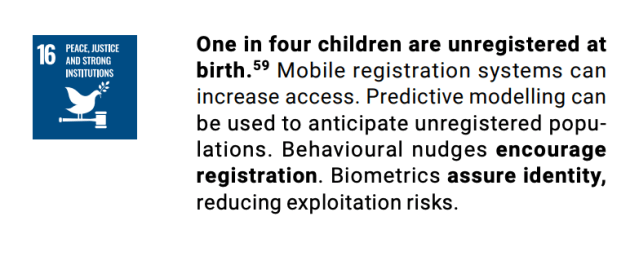
REFERENCES:
- 1 http://www.un.org/sites/un2.un.org/files/sotf-co-facs_mgos-cs-letter_zero-draft-presentation.pdf
- 2 webtv.un.org/en/asset/k13/k131jwybc8
- 3 http://www.un.org/en/summit-of-the-future#:~:text=The%20Pact%20will%20be%20negotiated,humanity%20and%20for%20future%20generations.
- 4 http://www.un.org/sites/un2.un.org/files/sotf-co-facilitators-zero-draft_pact-for-the-future.pdf
- 5 http://www.g20.org/en
- 6 http://www.g20.utoronto.ca/2023/230612-sdg-action-plan.html
- 7 healthpolicy-watch.news/lies-and-entrenched-positions-undermine-who-pandemic-negotiations/
- 8 http://www.un.org/sites/un2.un.org/files/our-common-agenda-policy-brief-information-integrity-en.pdf
- 9 http://www.g20.org/en/news/world-economic-forum-report-states-that-disinformation-and-extreme-weather-are-the-main-threats-to-the-world-today
- 10 un-futureslab.org/
- 11 http://www.un.org/sites/un2.un.org/files/our-common-agenda-policy-brief-emergency-platform-en.pdf
- 12 http://www.un.org/sites/un2.un.org/files/our-common-agenda-policy-brief-youth-engagement-en.pdf
- 13 http://www.un.org/sites/un2.un.org/files/our-common-agenda-policy-brief-beyond-gross-domestic-product-en.pdf
- 14 press.un.org/en/2023/sgsm22007.doc.htm
- 15 http://www.un.org/sites/un2.un.org/files/our-common-agenda-policy-brief-international-finance-architecture-en.pdf
- 16 http://www.un.org/sites/un2.un.org/files/our-common-agenda-policy-brief-outer-space-en.pdf
- 17 http://www.un.org/sites/un2.un.org/files/our-common-agenda-policy-brief-new-agenda-for-peace-en.pdf
- 18 http://www.un.org/sites/un2.un.org/files/our-common-agenda-policy-brief-transforming-education-en.pdf
- 19 http://www.un.org/sites/un2.un.org/files/our-common-agenda-policy-brief-information-integrity-en.pdf
- 20 http://www.un.org/sites/un2.un.org/files/our-common-agenda-policy-brief-un-2.0-en.pdf
Source – Dr Jacob Nordangard – The Pharos Chronicles – Jacob Nordangård, PhD

_______________________________
The Time for Silence is Over
https://www.uncoverdc.com/2022/10/21/a-message-to-humanity-the-time-for-silence-is-over/
If you are a doctor or medical professional and you are reading this and aware of what is happening, the time for you to stay silent on account of self-preservation is over. The weight of what you know vs. a license, a job, etc., is too great. “Just following orders” or fear of scrutiny won’t cut it anymore. Several have come before you to lay the groundwork so you, too, can be brave.
If you are the every-man, there are still people you haven’t spoken to. Call them today. Don’t wait. Prepare your information, and get it ready for an email or text. Sit with them and discuss it. Have them over. Watch an interview or seminar. Make them stay out of respect for you because you are respecting them; you are trying to save their life.
If you are the every-man with a bit more nerve, go stand outside of your nearest school with a packet of information to hand out to parents on the car line. Do it until they threaten to arrest you, and get arrested if you must. It is that serious. It must be done. Go to a mall and flier the windshields of every car in the parking lot. Create a landing page or send people to a reputable site with the needed information. Get your boots on the ground. Do it today. Do not wait. Your fellow human needs you right now.
We are in the midst of one of the greatest psychological operations in human history.

https://www.reignitefreedom.com/
The third step is to unsubscribe from all mainstream media outlets. Delete the apps from your phone, laptop, and tablet and unfollow all of their social media and YouTube channels. Try to avoid mainstream media for at least one week, even if the headline is intriguing.
In the same time why not removing all the big tech tracking/spying/social credit system around you: (Youtube, Facebook, Instagram, Twitter, Tik Tok, Google, Apple, Microsoft, Whatsapp, Zoom, Linkedln, Snapchat, Tumblr, Pinterest, Reddit, Myspace, etc.)
The fourth step of the global walkout is to move as many accounts as you can to a union or local bank.

If you like our work please consider to donate :
_______________________________
If you are looking for solutions (lawyer, form, gathering, action, antidote, treatments, maybe this could help you:
HERE
If you want to fight back better:
https://childrenshealthdefense.org/child-health-topics/health-freedom/defender-days-sticker-gallery/
Find the others: www.freedomcells.org
Spike Protein Protocol
McCullough MD (aug 2023):
He recommended three supplements to mitigate harm and degrade spike proteins:
1. Nattokinase – 2000 units twice a day. Breaks down spike protein.
2. Bromelain – 500 milligrams once a day. Also breaks down spike protein.
3. Curcumin – 500 milligrams twice a day. Reduces inflammation and spike protein damage.
Urotherapy https://urotherapyresearch.com/ https://rumble.com/v2wsgmv-dir-ep8-heal-your-mitochondria-with-urotherapy-and-cutting-edge-regenerativ.html
Glutathione (most important for body detoxification) or better
NAC = N-Acetyl-Cysteine 600-750mg (causes the body to produce glutathione itself)
Zinc
Astaxantin 5mg (also improves vision)
Quercetin
vitamin D3
Milk thistle (also liver and stomach protection)
Melatonin 1mg to 10mg (against 5G)
Alternatively CDS/CDL and zeolite
Myocarditis: Nicotine
Dr. Zelenko’s Protocol contains Ivermectin, Hydroxychloroquine (HCQ), Zinc, Vitamin D3, and Quercetin.
Fasting cures everything!
How to find the truth :
Search engine: https://presearch.org/, https://search.brave.com/, Searx (choose the server that you want) or https://metager.org/
Videos: www.odysee.com
www.bitchute.com
www.brandnewtube.com
Facebook style: www.gab.com or https://www.minds.com/
INTELLIGENCE ISN’T KNOWING EVERYTHING, IT’S THE ABILITY TO CHALLENGE EVERYTHING YOU KNOW
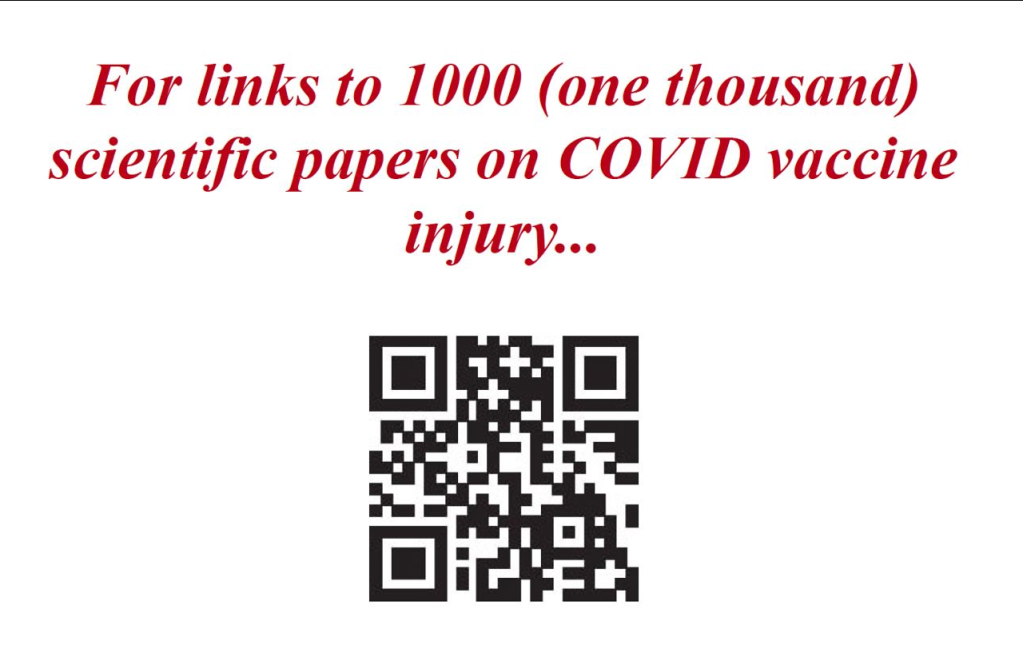

 RSS Feed
RSS Feed















 February 19th, 2024
February 19th, 2024  Awake Goy
Awake Goy  Posted in
Posted in  Tags:
Tags: 













